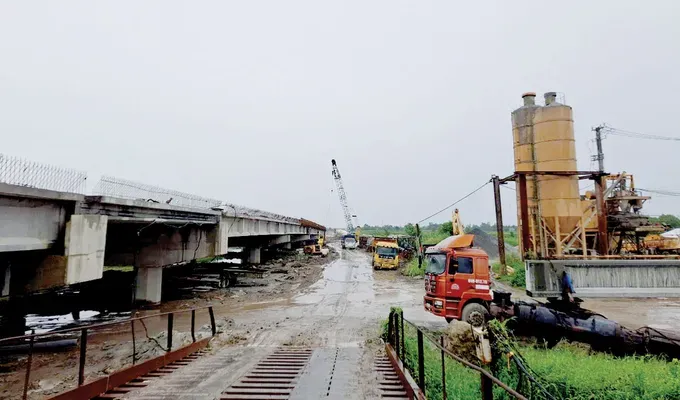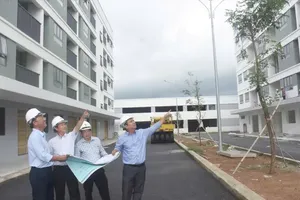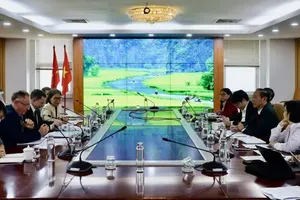
Resolution No. 66-NQ/TW of the Politburo on innovating law-making and enforcement (Resolution 66) and Resolution No. 68-NQ/TW on developing the private economy (Resolution 68) are being hailed as a “golden key”, unlocking opportunities for domestic enterprises to achieve breakthroughs and participate in a series of upcoming key national projects.
When asked about how businesses in the construction industry have received the Politburo’s Resolutions 66 and 68, Chairman Nguyen Quoc Hiep first confirmed that these resolutions contain many provisions that businesses have long awaited.
Resolution 68 clearly redefines businesses as “entities to be served” rather than “entities to be managed”. The change of these few words represents a true revolution in the thinking and awareness of civil servants. Translating this new awareness into action is a process that demands the full engagement of the entire government system at all levels.
In reality, there have been various cumbersome cases at the local level. In one instance, two businesses in a joint venture bidding on a project involving land use rights were required by local officials to seek clarification from both the Bidding Management Department and the Legal Department of the Ministry of Planning and Investment.
It took nearly five months to receive a response which merely cited the relevant law and instructed the locality to apply it. The businesses then had to spend an additional two months consulting the Ministry of Agriculture and Environment to finally resolve the matter. This delay is partly due to ambiguous guiding decrees and partly due to the limited qualifications as well as lack of dutifulness among some local officials.

Chairman Nguyen Quoc Hiep then explained his proposal on addressing a number of issues to offer more convenience to businesses at a recent working session with the Prime Minister and related ministries.
After the introduction of Resolution 66 and Resolution 68, the Construction Ministry is actively directing its units to implement the Prime Minister’s directives, specifically by reviewing procedures to significantly cut down and simplify administrative red tape in the construction sector. These are very positive signals.
Notably, during a recent meeting, Minister of Construction Tran Hong Minh was exceptionally empathetic and understanding of the current difficulties facing businesses. The Minister has directed a deputy minister and the heads of functional departments to work directly with the Vietnam Construction Contractors Association to specify the necessary amendments.
He also requested that functional agencies meet with associations and businesses semi-annually to stay updated and promptly address their challenges.
However, given the existing “jungle” of procedures, untangling them is no simple task. Simplifying administrative procedures requires reducing legal formalities in the initial investment stages, such as in investment licensing and construction permit planning adjustments. For procedures that cannot be eliminated, there is a need for specific operational guidelines, digitized implementation processes, clear timelines, and designated responsible parties.
Finally, answering the inquiry about feasible solutions by the Vietnam Construction Contractors Association for private businesses to effectively seize opportunities from key national projects like the North-South High-Speed Rail and the Lao Cai – Hanoi – Hai Phong railway, the Chairman mentioned the proposal to the Ministry of Construction on several special mechanisms to facilitate the participation of domestic contractors in these projects.
- The first recommendation is to waive the bidding criterion that requires contractors to have prior experience on one or two equivalent projects, as a high-speed rail project is unprecedented in Vietnam.
- Regarding financial capacity, it is suggested to allow the aggregated financial strength of all member companies in a bidding consortium to be considered, as most Vietnamese construction firms are small-capital enterprises.
- Furthermore, bidding packages should be structured to separate infrastructure construction from equipment supply, with each package scaled appropriately. For the bidding mechanism, it is proposed that the Government permit conditional direct appointment of contractors to save time and develop a system of comprehensive unit price norms for timely application.
- In terms of contract type, the Ministry of Construction should propose to the Prime Minister the use of lump-sum contracts coupled with a post-audit mechanism to reduce impediments for contractors. Additionally, the project contracts for the high-speed rail should be permitted for use as credit guarantees for project loans, with preferential interest rates applied.
Obviously, removing obstacles and creating favorable conditions for businesses will undoubtedly accelerate the implementation of numerous key projects in the near future.
























